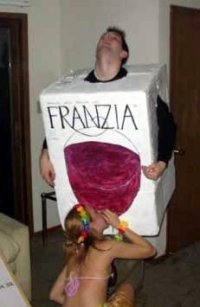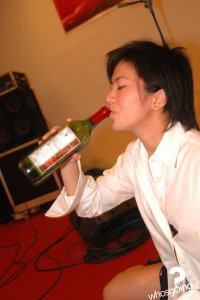
Mike Grgich celebrated 50 years of winemaking in the Napa Valley Saturday. Guest of honor at the gathering was George Taber, author of “Judgment of Paris.” Grgich made the chardonnay that bested French wines in the dramatic tasting that put Napa Valley on the map. Lianne Milton Photo
Taber, 'Judgment of Paris' author, blasts 'Bottle Shock'
for leaving out man who made the winning white wine
Wearing his trademark beret, Mike Grgich surveyed the sold-out, wait-listed party at Grgich Hills Estate winery last Saturday and said, “I cannot describe how happy I am tonight. It is a gratitude that comes not one fold but many fold.”
The occasion was the 50th anniversary celebration of Grgich’s arrival in the Napa Valley. The young man escaped from Communist-ruled Croatia with a suitcase and $30 American dollars in his shoe and, a little more than a dozen years later, made a Napa Valley chardonnay that set the wine world on its head when it bested the French wines in a blind tasting that’s come to be known as “the judgment of Paris.”
Warren Winiarski’s Stags Leap Wine Cellars Napa Valley cab took high honors for a red wine at the same event, which catapulted the Napa Valley onto the world-wide wine map.
George Taber, author of “The Judgment of Paris,” which describes the historic tasting, was among the guests paying tribute to Grgich at the dinner.
Grgich, sprightly at 85, shared anecdotes of his early years in the valley when, following his father’s advice, he tried “to be better every day.” Grgich said, “He taught me do your best every day to learn something new, and if you can’t do something important in a day, make a friend.”
Grgich’s career in wine began when he was 3, he explained, because in his family “everyone worked in the harvest,” including his mother — who would put him in a vat with grapes for safekeeping while she worked. However novel a method of childcare it was, it worked, he observed: He had plenty to eat and a way to pass the time, squashing grapes.
From the time at university when a professor whispered to him that California was “paradise,” Grgich was determined to find his way there “because who wants to wait to die to go to Paradise?”
When he finally got to the Napa Valley in 1958 he set about learning to make wine from everyone he could, including the men who have since acquired the status of legends: André Tchelistcheff at Beaulieu Vineyards, Brother Timothy at the Christian Brothers Winery and Robert Mondavi, who launched his own winery in 1966.
The triumph at Paris, Grgich said, was, in a sense, everyone’s achievement. It was no coincidence, he noted, that both he and Winiarski had worked for Mondavi. “It showed that the U.S. could make wine as good as the French, which is what Robert Mondavi always wanted,” Grgich said.
Blasting ‘Bottle Shock’
Grgich, who made the winning wine for Chateau Montelena in Calistoga, only made a passing reference to the recently released film “Bottle Shock,” a film based on the Paris tasting, which, rather bizarrely, omits Grgich as well as Winiarski.
“If you have seen it,” Grgich remarked mildly, “you will notice I am not in it.”
In a private conversation, Grgich said he had been sent a copy of the “Bottles Shock” script but he could not sign off on it, he said, “because I couldn’t find anything honest in it.”
He also noted it was not the first time a controversy had arisen over credit for the winning chardonnay. In 2006, he said, when Copia, the American Center for Food, Wine and the Arts in Napa, hosted a 30-year re-enactment of the Paris tasting, he was invited and then “uninvited.” He was given to understand that the owner of Chateau Montelena, lawyer turned vintner Jim Barrett, objected to his participation.
Taber, the only journalist who attended the 1976 tasting, was considerably more scathing in his remarks about “Bottle Shock.” Taber spoke during the dinner. At his first mention of the film another guest booed and Taber said, “I agree.”
Like many, the author questioned the judgment that left Grgich out of “Bottle Shock.”
“It’s unfortunate,” he said, “because it’s a version of reality that’s not true. The movie, unfortunately, does not tell the truth about what happened at the Paris tasting.”
He had recently seen the film, he said, “and I think I saw Mike’s beret twice.”
“The film, he said, “committed two sins against the truth, the sin of commission and the sin of omission … I can’t think of any other word that describes what went on in that movie.”
Taber said the characterization of Steven Spurrier, the British wine merchant who organized the tasting, was entirely off the mark and reduced the man to a stereotype. As for Grgich, Taber said, “the movie doesn’t talk about the guy who made the wine. The man who made the wine that put Napa on the map is not in the movie.
“I know it’s Hollywood,” he said, “but a true artist doesn’t rape reality.
“Mike’s is a wonderful story,” Taber said. “It really is the American dream and there aren’t many as rich as Mike’s. The Paris tasting was important and Mike played a major role, and it wouldn’t have happened if Mike hadn’t got off that Greyhound bus.”
In response to criticism of the film, a spokesman at Chateau Montelena said he was unfamiliar with the circumstances of the 2006 tasting, and that Jim Barrett was traveling and unavailable for comment. He referred questions about the film to its Sonoma producers, Marc and Brenda Lhormer.
Marc Lhormer said the original script, written by Los Angeles attorney Ross Schwartz, did include Grgich as a major character. But after “Mike said he didn’t like it” and the script was criticized for having too many characters, the decision was made to rewrite it, reduce Grgich’s role, eliminate mention of Winiarski and focus on “the drama of Jim Barrett as a lawyer struggling against the odds to realize a dream of making a go of owning a winery.”
Lhormer, who added that neither he nor his wife Brenda had ever spoken about the project to Grgich, said the script had also been sent to Barrett, who did not object to it.
Calls from the Register to Ross Schwartz were not returned as of press time.
Ironically, Chateau Montelena has also been in the news recently because of its pending sale to French vintner Michel Reybier.
Looking to the future
However it may be portrayed on film, the reality of his big win in Paris was that it allowed Grgich to realize his dream of opening his own winery, which he and Austin Hills founded in 1977.
“I think this is my best success,” Grgich said, noting that his family-owned winery is not only on sound financial footing and producing estate wines from organic and sustainably farmed grapes, but it’s in good hands for a second — and possibly third — generation to come. His daughter Violet and nephew Ivo Jeramaz are dividing responsibilities for running the winery and making the wines.
Plus, Grgich noted, “Ivo has six children and my daughter has her son.”
Violet Grgich, a gifted musician, provided a grace note at the evening’s end. Performing on the harpsichord with her husband, Colin Shipman, playing the viola da gamba, she told the audience. “In honor of the Paris tasting and my father’s winning wine, and of George Taber being here, we thought we would play some French music.”
Correction: An erlier version of this article misstated information about Austin Hills
SASHA PAULSEN



